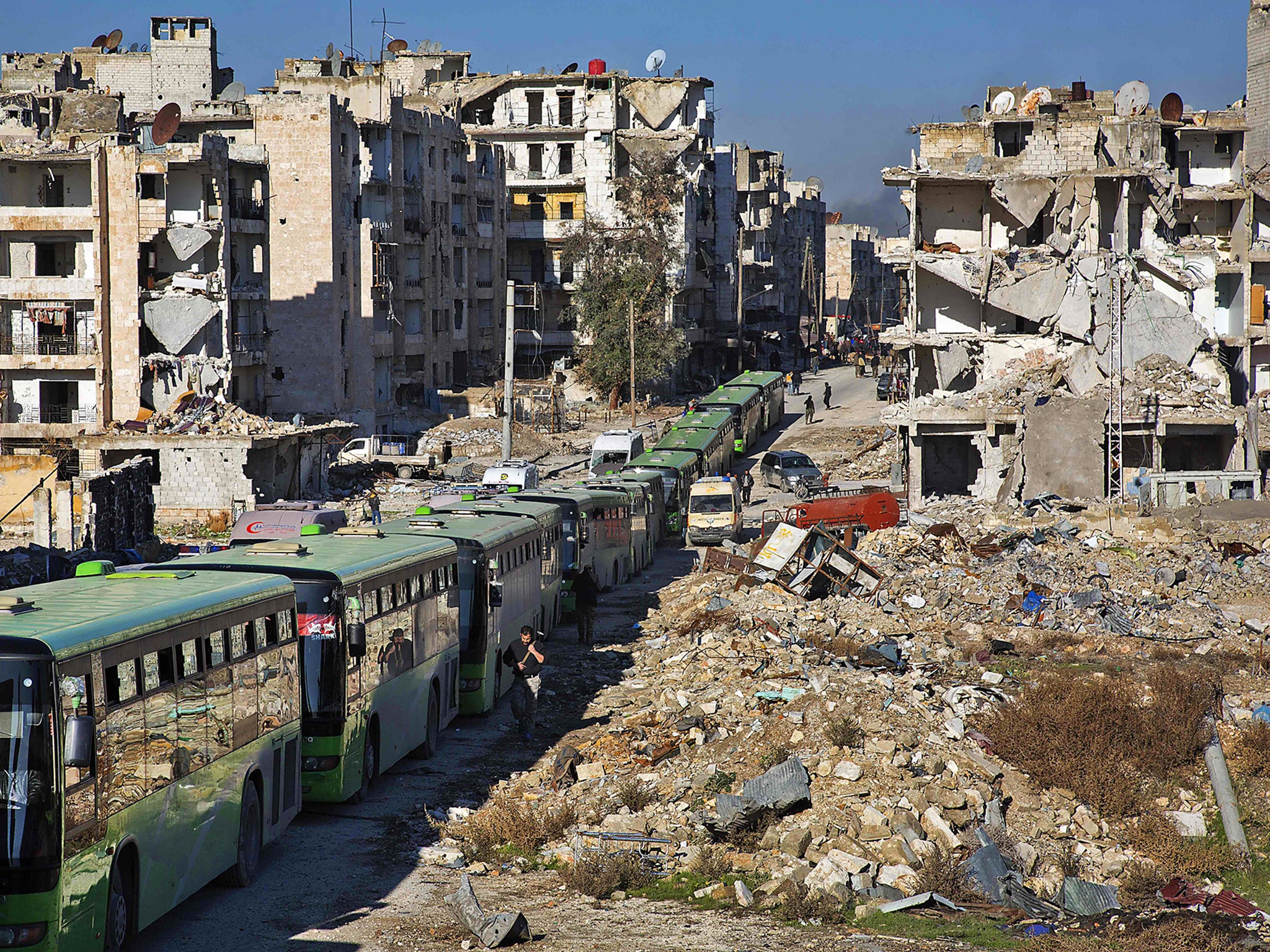Meeting of international anti-Isis coalition overshadowed by West's failings over Aleppo
The reaction of the incoming US President-elect, Donald Trump, to the situation in Syria in Iraq is also a key topic of discussion

A meeting of the international coalition against Isis has ended in London with a declaration that the jihadists, fighting for their Iraqi stronghold in Mosul and facing an impending assault on Raqqa, their ‘capital’ in Syria, will soon be defeated.
But the meeting of 14 states took place against a sombre background of continuing recriminations over the impotence of the West in face of the brutal assault on Aleppo by the regime of Bashar al-Assad and its Russian and Iranian backers, and the uncertainty about the policies on Syria that Donald Trump will bring when he takes over at the White House.
The shadow of what is happening in Aleppo continued to dominate focus on Syria as the Isis conference was taking place. Boris Johnson summoned the Russian and Iranian ambassadors to the Foreign Office to express the government’s condemnation of their role in the operation.
Afterwards the Foreign Secretary said: “Both Russia and Iran have failed to uphold their obligation under international humanitarian law, specifically by failing to facilitate the delivery of humanitarian aid during the months when eastern Aleppo was besieged. They deserve no credit for the fact that an evacuation appears to be underway today. Having inflicted such suffering on the people, Iran and Russia cannot expect praise for allowing some people to escape at the final hour”.
During a House of Commons emergency debate over Aleppo earlier this week, George Osborne acknowledged that “this tragedy was created by a vacuum of Western leadership, British leadership”. It is American leadership which is the crucial factor and Mr Trump has already signalled that he wants to end support for Syrian rebels. The President-elect, who has publicly declared his admiration for Vladimir Putin, views Russia as an ally while the US-backed rebels regard it as an enemy state on which President Assad depends for his survival.
Defence Secretary Sir Michael Fallon urged people not to jump to conclusions over Mr Trump’s “campaign rhetoric” and wait to see what actions the new administration takes, stressing that Isis presented a “global threat”. He maintained: “I have no doubt that the next US administration will step up to its traditional role of global leadership”.
Aleppo before the Syrian Civil War
Show all 12US Defence Secretary Ash Carter, standing beside Sir Michael at a press conference in London, could give no such guarantee. “I can’t speak for the next administration” he said. However, he continued that the “coalition campaign was logical, made sense” and thus hoped that “logic will recommend itself to the future leadership of the United States, even as it has recommended itself to the current leadership.”
According to senior diplomats, Mr Carter, on his last trip to London in his post, has sought to reassure his European counterparts during the visit that his successor at the Pentagon, General James “Mad Dog” Mattis, will be a counterweight to those within the Trump administration who are expected to press for disengagement from Syria or are deemed to be close to Moscow.
A British team to train opposition fighters has arrived in Syria and Sir Michael announced a six month extension to the deployment of British troops carrying out infrastructure construction at an airbase, al-Asad, in Iraq. RAF warplanes, he said, were carrying out attacks in support of a rebel group, SDF (Syrian Democratic Forces) on approach routes to Raqqa.
Sir Michael said he had been assured that the rebel force heading for Raqqa was predominantly Arab. But although the SDF has Arabs in its ranks, it is Kurdish led and has been involved in clashes other Sunni Arab groups from the Free Syrian Army (FSA) including a faction supported by Turkey which has sent thousands of troops, backed by armour and aircraft, into northern Syria.
It is unclear where the rebels trained by the British will fit into a violent mixture of competing groups which are trying to seize Raqaa while fighting each other as well as Isis. The offensive is being carried out by Sunni Arab and Turkmen fighters of the FSA with Turkish support ; the SDF and the Kurdish militia YPG with American advisors and air support and the regime’s army with Russian, Iranian and Hezbollah backing.
Last month the rebels supported by the Turks captured three villages while at the same time carrying out attacks against the SDF. The SDF claimed to have repulsed the attack destroying a Turkish tank and then captured two villages themselves. Regime forces, backed by Hezbollah fighters, took four villages. The Turkish backed rebels claimed that the SDF provided fire support during the operation – more evidence, they insisted, to back their charge of collusion between Bashar al-Assad and the Kurds.
Subscribe to Independent Premium to bookmark this article
Want to bookmark your favourite articles and stories to read or reference later? Start your Independent Premium subscription today.

Join our commenting forum
Join thought-provoking conversations, follow other Independent readers and see their replies